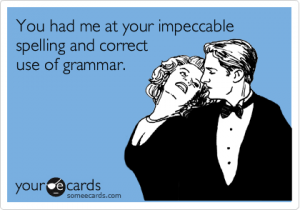Three Random Grammar Peeves That Are Socially Acceptable
 I don’t usually like to get picky about grammar, save for when I’m editing my own writing (or teasing my closest friends). Every now and then, however, I catch a few minor “mistakes” in the writing and speech of others that jump out at me. I use quotation marks because they aren’t necessarily wrong; I just tend to find them a bit odd, and occasionally a little annoying. Maybe there are others who would agree, and maybe sometimes it’s just me being my regular nerdy self.
I don’t usually like to get picky about grammar, save for when I’m editing my own writing (or teasing my closest friends). Every now and then, however, I catch a few minor “mistakes” in the writing and speech of others that jump out at me. I use quotation marks because they aren’t necessarily wrong; I just tend to find them a bit odd, and occasionally a little annoying. Maybe there are others who would agree, and maybe sometimes it’s just me being my regular nerdy self.
Just for fun, today’s topic brings you three random “pet peeves” of mine that are widely accepted as understandable language. You can decide for yourself where you stand on these…
1) When “could” really means “couldn’t”
I admit that it bothers me a little to see people using the phrase “I could care less” when they clearly mean to say “I couldn’t care less”. The logic behind the phrasing is simple: if you “couldn’t care less”, you’ve reached the limit of how little you can care about something, whereas if you “could care less”, there’s still a little part of you that does care and has yet to be eliminated.
I’ve heard a couple of theories as to how the “could” variation emerged in colloquial speech. One states that it was originally meant to be used in a sarcastic manner and not taken literally. Another explanation, according to American linguist Atcheson L. Hench, is that slurred speech has garbled the “couldn’t” of the correct phrase into the “could” that most people hear (American Speech, 159; 1973).
Which explanation is the truth? I have no idea. All I know is that I always use the original phrasing in my own speech, and if anyone doesn’t believe me when I say it’s the “correct” form, I couldn’t care less.
2) The American pronunciation of “niche”
I’ve lost count of all the playful arguments I’ve had with my best friend over this word. Our debates usually play out the same: I tell him the correct pronunciation is “neesh”; he answers back that people say “nitch”. I explain that the word comes from French, so its original pronunciation should be maintained; he argues that we’re American and we should adapt to the way most Americans speak. I ask him if by that logic, we should also start saying “ba-LET” and “gor-MET”; he claims that’s not the same thing because everyone says “ba-LAY” and “gor-MAY” without a problem. Then we toss the word “niche” back and forth, each of us insisting that our pronunciation is correct, until we both get tired and agree to disagree before changing the subject. After the entire discussion is over, we’re still friends.
Albeit friends who each still think they’re right. (Neesh.)
3) The alternative spelling of “doughnut”
To be fair, this one is more of a personal preference than an actual pet peeve. I understand that both “doughnut” and “donut” are equally acceptable spellings; I just prefer the former because it seems to me – for lack of a better description – “more correct”. It is the original spelling, after all; the invention of doughnuts can be traced back as far as the 19th century, but the earliest known printed use of the word “donut” is only from 1900 (Peck’s Bad Boy and His Pa by George W. Peck). Not to mention, “doughnut” also feels more complete: just by looking at the word, you can already tell what the main ingredient is…
Still, both spellings are equally pervasive in American English, though “doughnut” seems to be the more common form outside of the United States. Oxford Dictionaries list “donut” as the alternative spelling of “doughnut”, making the longer word the traditional option for more formal writing, yet the shortened form is popular for references like company names (e.g. Dunkin’ Donuts). Even my best friend (yes, the same young man who advocates so strongly for “nitch”) insists that “donut” is the best spelling because it’s modern, and thus more appealing to the readers of today. As he says whenever I insist that “doughnut” is the better choice, “Take it up with The Donut Man!”
These are just a few random examples of minor deviations from my grammatical standards. Like I said, they aren’t really wrong; it’s all a matter of preference. And call me a geek if you like, but I simply chose the alternatives that I deemed grammatically correct.
So what about you? Can you relate to any of the examples listed above? Do you have pet peeves of your own that don’t really detract from communication more than they just annoy you?


Recent Comments